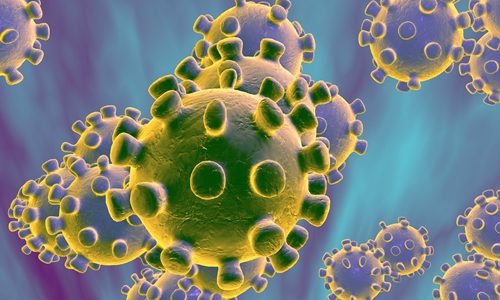HOME >> OPINION
US tendency to politicize public health emergencies a hinderance
By Wang Congyue Source:Global Times Published: 2020/2/6 21:28:43

Photo: IC
Since the US government declared the novel coronavirus a public health emergency on January 31, entry of foreign nationals who have traveled to China in the last two weeks has been suspended, visa issuance in China and flights to and from China have also been stopped, all of which is in contrast to WHO's recommendation against "measures that unnecessarily interfere with international trade or travel."
In the meantime, the US Centers for Disease Control and Prevention (CDC) has issued its "Update and Interim Guidance on Outbreak of 2019 Novel Coronavirus," developed kits to detect the virus, and deployed multidisciplinary teams to Washington, Illinois, California, and Arizona to assist health departments with clinical management, contact tracing, and communications.
Since the 9/11 attacks, the US has been patching leaks and updating its legislation and procedures of response mechanisms to public health emergencies and promoting coordination between federal laws and rules in different states.
A relatively mature legal system has assured the US' leading position in the world in responding to public health emergencies, but the country has also undergone challenges from outbreaks of anthrax in 2001, SARS in 2003, H1N1 influenza in 2009, Avian influenza (H5N1) in 2015 and the ongoing 2019-20 flu season.
There are several problems with the US current disease prevention system. For example, communication between the federal government and local departments at the epicenter is lagging and inaccurate; small cities and towns lack the capacity to deal with public health emergencies via their obsolete public health infrastructure; and there are structural flaws and realistic contradictions among the states.
First, racial stereotypes, class isolation, and gender discrimination have made inequality a routine of regular daily medical treatment and the handling of public health emergencies. According to a report published in JAMA Network Open in June 2019, based on data collected by CDC from 1993 to 2017, white men in the highest income bracket were the healthiest group, but the health of the lowest income group has declined substantially over time.
The Century Foundation issued a report in December 2019, saying "as of 2018, the uninsured rate among African Americans was 9.7 percent, while it was just 5.4 percent among whites." When an average American family spends about 11 percent of household income on medical care, the figure approaches 20 percent for African American families.
A study produced in 2019 by the Boston University School of Medicine found that "the proportion of white patients [in the US] transported to the reference (or most frequent) emergency department destination was high (61.3 percent)," and "black and Hispanic patients were more likely to be transported to a safety-net hospital." If epidemic crisis is taken into consideration, then chances of safeguarding fairness would be gloomier.
Take Hurricane Katrina in 2005 as an example. A Washington Post/Kaiser Family Foundation/Harvard University poll of 680 evacuees, 93 percent of whom were African American, found that 68 percent believed the response would have been quicker for White and wealthier people.
As New York Times columnist David Brooks put it, "Floods wash away the surface of society, the settled way things have been done. They expose the underlying power structures, the injustices, the patterns of corruption and the unacknowledged inequalities."
Moreover, US President Donald Trump's proposed budget for the 2020 fiscal year was delivered to Congress in March 2019. In it, Trump proposed to cut funding to the Department of Health and Human Services (HHS) by 12 percent and by 10 percent for the Centers for Disease Control and Prevention (CDC).
John Auerbach, president and CEO of Trust for America's Health said, "the proposed CDC cuts not only threaten federal public health capacity, they would have a 'devastating' impact on state and local public health departments, which depend heavily on CDC dollars flowing down to the community level," reported the US newspaper Nation's Health.
Some Americans even raised the question of whether Trump could swiftly get the flow of 100 million citizens under control, lock down the epidemic area and build new hospitals in 10 days like China did if it was the US that was confronting the outbreak of novel coronavirus.
The tendency of politicizing public health emergencies hinders international cooperation to fight epidemics. In the context of globalization, infectious diseases can pose a significant impact on both traditional and non-traditional security of all countries. Only by proactively promoting international collaboration and establishing a global security network can we create a win-win environment.
Remarks by US Commerce Secretary Wilbur Ross that the coronavirus outbreak in China could help bring jobs to America, have underscored some US politicians' lack of international morality and their propensity to treat the epidemic as a political tool. This will further complicate the public health security situation in both the US and the world.
The author is assistant research fellow at the Institute of American Studies, Chinese Academy of Social Sciences. opinion@globaltimes.com.cn
Posted in: VIEWPOINT